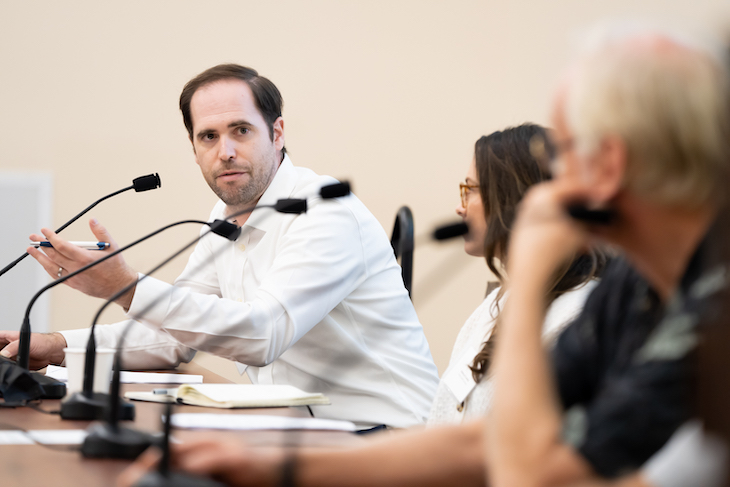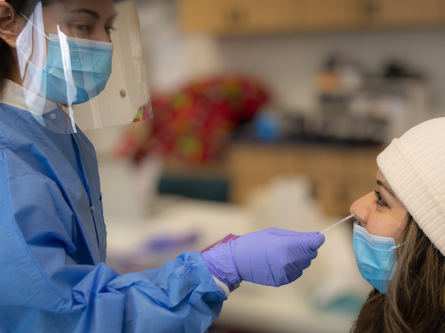By Íñigo Verduzco Gallo, ÓRALE's Manager.
I recently presented on how ÓRALE could serve as a model to design public health interventions in the face of public health emergencies due to climate change at the Annual Retreat of the UC Davis Environmental Health Sciences Center. This made me think hard about why ÓRALE was able to accomplish what it has accomplished, and two basic underlying principles of intervention design were key to this success:
- From community engagement: Trust
- From design thinking/human-centered design: Empathy
In terms of community engagement, I think anyone who saw ÓRALE in action would immediately recognize the incredible role that ÓRALE’s community partners played at all levels. This is because, from its conception, the project aimed to be a true partnership at all levels between community partner organizations and UC Davis.
At the top, community partner organizations were full-fledged members of ÓRALE’s Steering Committee, able to directly influence how ÓRALE prioritized resources and set its overall strategic direction. On a day-to-day basis, community partner organizations helped identify communities with limited or no access to COVID-19 testing services, and helped staff testing events. Community partners were an invaluable source of information about how members of their communities were experiencing the pandemic, what kind of health information was needed, and how best to communicate this information to the communities.

What this amounted to, and what it ultimately achieved, was that ÓRALE was able to gain the trust of the community. Being in strategic locations every week, through the pandemic’s lulls and peaks, with friendly bilingual and bi-cultural staff, ultimately helped ÓRALE become a trusted partner to these communities. The implicit message that ÓRALE’s presence sent was that we were not just passing by, we were going to be there for them through the worst of the pandemic.
ÓRALE also got right a key principle of design thinking: empathize with your users.
From the beginning, ÓRALE’s community partner organizations, Principal Investigators, and staff tried hard to put themselves in the shoes of those who ÓRALE aimed to serve. A constant underlying message in any directive from the project’s leadership team was: the burden falls on us! We had to address barriers and roadblocks to access COVID-19 testing that individuals living in these communities faced. Be it by having fully bilingual staff on site, working during weekends, operating sites in remote locations using mobile labs, scheduling testing events late evenings and nights – when farmworkers usually return from their long workdays, offering rapid antigen tests for free and delivering test results in a few minutes and on-site without the need to access any cumbersome online platform, etc. We had to learn what the community needed and adapt to their needs, not the other way around.
"The implicit message that ÓRALE’s presence sent was that we were not just passing by, we were going to be there for them through the worst of the pandemic."
Another key to ÓRALE’s success was its team of committed community partner and UC Davis field staff that worked through long days and weeks, extreme heat, smoke, pandemic peaks, and long stretches of time away from loved ones. Without their commitment to step up and be there for our communities during these exceptional times, many more people would have been unable to get the help they desperately needed.
To be fair, there are many things that ÓRALE did not get quite right, or simply got wrong. The project had many shortcomings and reflecting on these flaws will be a necessary exercise for everyone who was a part of this project. We owe it to ourselves as well as the communities ÓRALE served.
But, I remain positive. I think that one of the most valuable lessons we can take from ÓRALE is that it has prooved that, together, community partners and UC Davis can tackle new and complex public health challenges affecting Latino communities in the Central Valley.
With climate change becoming an increasing public health threat to our communities, partnerships like ÓRALE hold the promise that community partners and UC Davis can stand together to face this challenge as well.
Íñigo managed ORALE’s operations until September 2022. He recently joined the Carvajal-Carmona Lab at the UC Davis Genome Center, where he is working on several initiatives that aim to better understand genetics, disparities, and cancer precision medicine in minority populations. He has over 15 years of professional experience leading and managing complex multicomponent and multidisciplinary research projects with a focus on marginalized and underserved populations in the U.S. as well as in Latin America and Sub-Saharan Africa.



